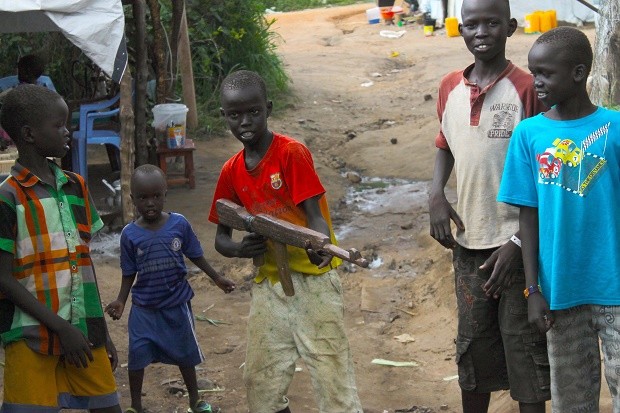UN: 10,000 children killed, maimed in conflicts worldwide

A group of children at the United Nations protection of Civilians site in Juba, South Sudan, play with a makeshift gun. AP File Photo
UNITED NATIONS — More than 10,000 children were killed or maimed amid armed conflicts worldwide last year, while others were raped, forced to serve as armed soldiers or caught in attacks on schools and hospitals, a United Nations report said on Wednesday.
A total of more than 21,000 violations of children’s right were reported in 2017 — a sharp increase from the previous year, according to the annual “Children and Armed Conflict” report.
The UN blames a United States-backed Arab coalition fighting in Yemen for at least half of the more than 1,300 child deaths or injuries recorded in that poor nation. They were victims of aerial and ground attacks by Saudi Arabia and the United Arab Emirates on Houthi rebels opposed to Yemen’s internationally recognized government.
Among the casualties tallied in the report were child soldiers as young as 11 fighting in Yemen’s civil war and in other countries, the UN said.
“The point is, these kids should not be treated like children of a lesser God; they deserve the same rights as every kid to live their lives at least meaningfully, and to be given a chance at recovery,” said Virginia Gamba, the UN special representative for children and armed conflict.
Article continues after this advertisementShe said the report left UN Secretary-General Antonio Guterres feeling “outraged.”
Article continues after this advertisementThe 21,000 violations of children’s rights included 10,000 who were slain or maimed, especially in Iraq, Myanmar, the Central African Republic, the Democratic Republic of the Congo, South Sudan, Syria, and Yemen, the report said.
The total was a dramatic increase from 15,500 such cases counted in 2016.
“The secretary-general is outraged at this number, a significant increase compared to previous years,” said his spokesman, Stephane Dujarric.
Among other findings in the report were:
- Almost half the 881 verified child casualties in Nigeria resulted from suicide attacks, including the use of children as human bombs. Over 1,900 children were detained because of their or their parents’ alleged association with the Boko Haram militant organization.
- At least 1,036 children were held in Iraqi detention facilities on national security-related charges, mostly for their alleged association with the Islamic State group.
- 1,221 children were recruited and used as soldiers in South Sudan.
- The al-Shabab extremist group in Somalia allegedly abducted more than 1,600 children, some recruited and armed and others who became victims of sexual violence.
- Children in Myanmar, South Sudan, Syria, and Yemen were prevented from receiving life-saving support.
- Syrian children were trapped in besieged areas amid deteriorating living conditions.
Gamba said government forces in various nations were responsible for about 9,000 violations.
“The report details the unspeakable violence children have been faced with, and shows how in too many conflict situations, parties to conflict have an utter disregard for any measures that could contribute to shielding the most vulnerable from the impact of war,” Gamba said.
“When your own house or your school can be attacked without qualms, when traditional safe havens become targets, how can boys and girls escape the brutality of war? It’s despicable,” Gamba added. /kga